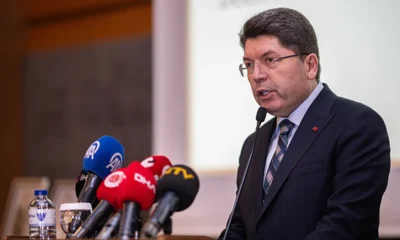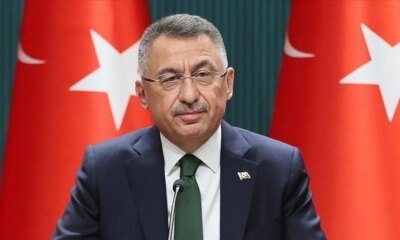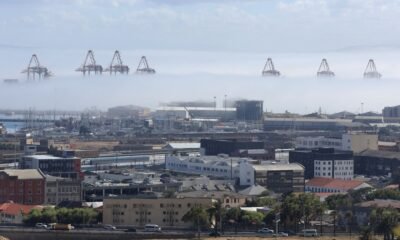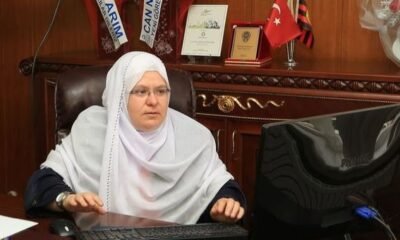Economy
Hitachi Energy to invest $70M in Türkiye to expand transformer ops
Hitachi Energy will invest $70 million in Türkiye to expand its transformers manufacturing capacity, the Swiss-based supplier of power technology and electrification announced on Thursday.
The investment will be directed toward its plant in Dilovası district of northwestern Kocaeli province, where production capacity is expected to increase by 70%, the company said in a statement.
The expansion is also projected to boost the company’s workforce in Türkiye by 30%, the statement said. The company currently employs more than 1,100 people in Türkiye, according to its website.
Hitachi Energy said demand for electricity in Türkiye, as well as throughout both Europe and Asia, is growing “exponentially” and suggested that the industry and energy infrastructure “simply can’t keep up.”
“Recent geopolitical volatility has exacerbated supply chain disruption and poses additional concerns from an energy security, accessibility, and volatility standpoint,” it noted.
The power transformers facility, one of Hitachi Energy’s major production hubs, will undergo a significant upgrade with the construction of an additional 45,000 square meters of operational space.
The project is scheduled for completion by 2026, the company said.
“The move to the Organized Industrial Zone in Dilovası offers significant advantages, including ease of transportation of transformers due to its proximity to the commercial port,” said Yasemin Hoşder Öztekin, country managing director at Hitachi Energy.
“This investment underscores our commitment to supporting the energy transition and meeting the decarbonization needs of our customers.”
As part of the investment, employees from the Kartal factory in Istanbul will transition to Dilovası, the company said. Hitachi Energy currently has four factories in Türkiye.
Economy
Trump weighing US exit from Mexico-Canada trade pact, report says
President Donald Trump is privately discussing the possibility of withdrawing from the U.S.-Mexico-Canada Agreement, Bloomberg reported Wednesday, citing officials familiar with the matter, a move that could inject fresh uncertainty into upcoming renegotiations of the trilateral trade deal.
Officials who spoke to the news organization on condition of anonymity about the internal discussions said the president has asked aides why he should not renounce the pact he made during his first term, but he has stopped short of signaling he would do so.
When questioned about the talks, a White House official characterized Trump as the final arbiter and someone who is constantly looking for a better bargain for the American people. Any discussion of possible action before the president made an announcement was nothing more than unfounded conjecture, according to the official.
A representative in U.S. Trade Representative Jamieson Greer’s office said the administration planned to keep Trump’s options open and engage in negotiations to resolve identified flaws, saying that approving the 2019 terms was not in the best interests of the country.
Speaking on condition of anonymity, both officials refrained from openly addressing whether Trump was considering leaving the trade agreement. Greer stated Tuesday that the administration would have separate discussions with Canada and Mexico, citing the more tense trade relations with Canada. He made no mention of Trump’s approval of an extension.
The USMCA took the place of the North American Free Trade Agreement (NAFTA), which governed commerce between the three nations since 1994 but was criticized by Trump during his initial presidential campaign. Trump vowed to withdraw from NAFTA before accepting the revised agreement, which included a sunset clause that required a renegotiation this summer and tighter regulations and increased U.S. car content standards.
On July 1, the USMCA will undergo a mandated review prior to a potential extension. The procedure, which was first anticipated to be routine, has turned into a heated negotiation. Trump has put pressure on Ottawa and Mexico City to address unrelated matters like defense, migration and drug trafficking, in addition to demanding additional trade concessions.
Stricter rules of origin for important industrial goods, improved cooperation on crucial minerals, worker safeguards and dumping are all areas of potential concern, an official stated, adding that Greer will suggest a renewal if a settlement integrating input from industry stakeholders can be reached.
The agreement would be in effect for an additional 16 years if the nations consented to a renewal. But if that does not occur, it can lead to yearly reviews for 10 years, until the agreement expires in 2036. Any nation could give six months’ notice before announcing its intention to leave.
The treaty covers almost $2 trillion in products and services, so such a move would rock the foundations of one of the biggest economic relationships in the world. Even the prospect of a U.S. withdrawal would make investors and world leaders more uneasy.
Economy
Retail sales in Türkiye end 2025 with strongest growth in 7 months
Retail sales growth in Türkiye accelerated in December to the highest level in seven months, ending the year on a high note after several months of robust performance, official data showed on Wednesday.
The volume of retail sales climbed 16.3% on a yearly basis in December, after also posting notable rises in November and October, according to the Turkish Statistical Institute (TurkStat).
This was the strongest growth since May, when retail sales had risen 17.7%, the data showed.
The annual sales growth in non-food products, except automotive fuel, was 20.3% in December, while that of food, drinks and tobacco stood at 9.6%.
Data also showed that automotive fuel sales logged an expansion of 8.3% on a yearly basis. Sales via mail orders or the internet grew 16.7% over the same period.
Meanwhile, on a monthly basis, retail sales increased at a stable rate of 1.7%.
At the same time, the broader trade sales volume, which is comprised of retail sales, wholesale and retail trade and repair of motor vehicles and motorcycles and wholesale trade jumped 3.8% on an annual basis in December.
In the same month, wholesale and retail trade and repair of motor vehicles and motorcycles sales volume surged by 3.0%, while wholesale trade sales decreased by 1.0%.
Month-over-month total trade sales volume increased by 2.1%, TurkStat said, compared to a 0.8% increase in November.
Retail sales and trade sales in general are a significant indicator of consumption and consumer behavior, and they contribute to gross domestic product (GDP).
Economy
WTO chief calls for its reform, says ‘status quo not option’
The World Trade Organization (WTO) is in need of an urgent reform, its chief warned Wednesday, saying that she does not think “the status quo is an option.”
“We are meeting today at an inflection point, not just for the WTO, but … for the multilateral system,” WTO head Ngozi Okonjo-Iweala told reporters, saying that if the global trading system were allowed to lapse, it would be “chaos.”
“We need to change to fit with the times,” she said.
Reform will be at the heart of the WTO’s ministerial meeting in Cameroon next month.
The World Trade Organization regulates large swathes of global trade but is handicapped by a rule requiring full consensus among members, and a dispute settlement system crippled by the U.S.
The Geneva-based organization faced structural and geopolitical obstacles long before U.S. President Donald Trump returned to the White House last year and dramatically ratcheted up global trade tensions.
Speaking at the WTO’s headquarters, Okonjo-Iweala said that “the world is moving so fast … If you look at the speed at which technology is moving, and AI is moving and quantum technologies are moving.”
“If your organization doesn’t adapt, then you’ll be left behind,” she said.
“This organization provides stability and predictability,” she added, hailing that “in spite of all the knocks, it is still the bedrock for so much of world trade.”
“If we don’t have this system, what does it mean? I’ll be very honest with you: there’ll be chaos,” she said.
“It means a business will send goods somewhere without the knowledge of how those goods will be valued when it arrives at customs … you wouldn’t know how your goods will be valued before you’re tariffed. You wouldn’t know whether you’re going to make money or not.
“You’ll be confronted when your goods arrive with rules that you were never aware of,” she said.
Economy
European firms cut jobs in face of slowing economy, tariffs
Several European companies have frozen hiring or cut jobs over the past year, including consumer goods giants and some of the major brands in the automotive sector, citing difficult economic conditions exacerbated by U.S. tariffs.
The automotive industry in particular was hit hard in recent years, first by rising competition from China, but then also pressure stemming from quickly changing trade policies of the new U.S. administration.
Danish companies such as Orsted, which operates in the wind energy sector and pharmaceuticals giant Novo Nordisk have also announced layoffs.
Orsted, last year, canceled plans to build one of the U.K.’s largest offshore wind farms, while it also faced headwinds in the U.S. due to the policies of the Trump administration, which increasingly promotes fossil fuels. The administration suspended leases on several large offshore wind projects in December.
At the same time, Novo Nordisk, which has previously boomed amid growing demand for weight loss medications, announced it would cut as many as 9,000 jobs, and it also issued a warning last week that its profits and sales could drop as much as 13% this year.
On Wednesday, Dutch brewer Heineken became the latest one to say it would reduce its workforce.
Here is a look at some of the companies that announced layoffs in recent months.
Car and car parts makers
Bosch: The German home appliance manufacturer will cut 13,000 jobs, it said on Sept. 25.
Continental: The German tire maker plans to cut 1,500 additional jobs at its ContiTech rubber and plastics division, a works council source said on Nov. 24, on top of the 10,000 job cuts announced group-wide in restructuring efforts.
Daimler Truck: The truckmaker confirmed media reports on Aug. 1 that it would cut 2,000 jobs across its plants in the U.S. and Mexico, on top of the previously announced 5,000 job cuts in Germany.
Man: The German truckmaker plans to cut around 2,300 jobs over the next decade, a spokesperson said on Nov. 20.
Renault: The French carmaker confirmed on Oct. 4 that it was planning cost cuts but said it had no figures to report yet, after a newsletter reported it would cut 3,000 jobs by year-end in support services at its headquarters and other locations worldwide.
Banks
Lloyds: The British bank will consider the dismissal of around half of 3,000 staff to cut costs, a source familiar with the matter told Reuters on Sept. 4.
Abn Amro: The Dutch bank plans to cut 5,200 jobs by 2028, it said on Nov. 25.
Energy sector
OMV: The Austrian oil and gas company plans to cut 2,000 positions, or a 12th of its global workforce, the Kurier newspaper reported on Sept. 4.
Semiconductors
Ams Osram: The Austrian semiconductor supplier and sensor maker will launch a cost-cutting programme that will affect about 2,000 employees, it said on Feb. 10.
ASML: The Dutch chip equipment maker said on Jan. 28 it would cut 1,700 jobs, some 3.8% of its staff, as part of a broader plan to shed 3,000 management posts and hire engineers to focus on innovation.
Industrials and engineering
Sika: The Swiss industrial and construction chemicals maker said on Oct. 24 it would cut up to 1,500 jobs in persistently weak markets such as China.
Thyssenkrupp: The German industrial group’s steel division said on Dec. 1 it had agreed with the IG Metall union to cut or outsource about 11,000 jobs, or 40% of its workforce, in an agreement lasting until 2030.
Wacker Chemie: The German chemical company said on Nov. 27 it would cut more than 1,500 jobs, or around 9% of its workforce, by the end of 2026, blaming high energy costs and bureaucratic red tape in Germany.
Consumer goods
Burberry: The British luxury brand will shed 1,700 jobs or around a fifth of its global workforce, it said on May 14.
Heineken: The Dutch brewer will cut up to 6,000 jobs globally over the next two years as strained consumer finances, bad weather and geopolitical tensions take their toll, it said on Feb. 11.
Nestle: The group will cut 16,000 jobs, or 5.8% of its staff, it said on Oct. 16.
Others
Ericsson: The Swedish telecommunications equipment maker will cut some 1,600 jobs in Sweden, it said on Jan. 15, as it weathers a prolonged downturn in telecoms spending.
Lufthansa: The German airline group said on September 28 it would cut 4,000 administrative jobs by 2030.
Kuehne+Nagel: The Swiss freight forwarder will target 1,500 jobs under a cost-cutting programme to combat margin pressures and overcapacity, it said on Oct. 23.
Novo Nordisk: The Danish pharmaceutical company will cut 9,000 jobs globally, it said on Sept. 10.
Orsted: The Danish wind power group said on Oct. 9 it would cut around 2,000 jobs by the end of 2027, a quarter of its workforce.
Telefonica: The Spanish telecoms company will cut more than 4,500 jobs in Spain, union representatives said on Dec. 17 following negotiations.
Economy
Türkiye imports record 273.3 tons of silver in January amid global rush
Türkiye imported a record amount of silver last month, marking a monthly high, as prices of the precious metal rose at an unprecedented level at the start of the year, a report showed on Tuesday.
The country imported 273.3 tons of silver in January, compared to 31.55 tons in January 2025, Anadolu Agency (AA) reported, citing data from the Turkish stock exchange Borsa Istanbul’s precious metals market report.
The figure was also up from December’s 65.56 tons, according to the report.
At the same time, Türkiye’s gold imports totaled 7.79 tons last month, down from 9.65 tons in January 2025 and 10.92 tons in December.
Silver prices surged over 50% through January, buoyed by higher industrial demand, tightening physical conditions, and geopolitical tensions.
However, after hitting a historic high of $121.67 per ounce at the end of January, silver prices have fallen more than 33% since the start of February, due to easing geopolitical tensions and falling expectations of a Federal Reserve (Fed) rate cut.
The choice of Kevin Warsh as the next Fed chair set off a wave of selling in risk assets that had sent precious metals tumbling, reversing much of the gains recorded in January.
Warsh, whom the markets see as hawkish in relation to monetary policy, if confirmed, is likely to succeed Jerome Powell, who often was at odds with U.S. President Donald Trump over the pace of rate cuts.
Simmering tensions between the U.S. and Iran, which appeared to have somewhat eased in recent days, are also considered to have pushed prices of gold and silver down. However, small fluctuations are still visible.
On Wednesday morning, spot silver was up 3.4% at $83.40 per ounce, after falling more than 3% in the previous session.
Gold prices also gained slightly on Wednesday, buoyed by a weaker dollar and lower Treasury yields, while investors awaited key U.S. jobs data later in the day for clues on the Federal Reserve’s policy outlook.
Spot gold was 0.5% higher at $5,048.27 per ounce by 08:31 a.m. GMT. U.S. gold futures for April delivery gained 0.8% to $5,072.60 per ounce.
Gold was at nearly $5,600 on Jan. 29, the highest on record. Retail and central banks’ demand around the world has spurred prices of gold to unseen levels and investors and analysts predict they are likely to maintain an upward momentum this year.
Economy
Labor crunch prompts Russia to pivot to India for workers
A tired group of Indian men with sports bags stood in line at passport control at a bustling Moscow airport one recent evening after traveling more than 2,700 miles, including a stop in Uzbekistan, in search of work.
“I have a contract for one year. In the rubbish disposal business. The money is good,” said Ajit, one of the men, speaking in English.
Faced with what the authorities say is an immediate shortage of at least 2.3 million workers, a shortfall exacerbated by the strain of Russia’s war in Ukraine and one that Russia’s traditional source of foreign labor – Central Asians – is not able to fill, Moscow is turning to a new supplier: India.
Indian influx helps make up labor shortfall
In 2021, a year before Russia sent its troops into Ukraine, some 5,000 work permits were approved for Indian nationals. Last year, almost 72,000 permits were okayed for Indians – nearly a third of the total annual quota for migrant workers on visas.
“Currently, expatriate employees from India are the most popular,” said Alexei Filipenkov, director of a company that brings in Indian workers.
He said workers from ex-Soviet Central Asia, who do not need visas, had stopped coming in sufficient numbers. Official figures show they still made up the majority of some 2.3 million legal foreign workers not requiring a visa last year, however.
But a weaker ruble, tougher migration laws, and increasingly sharp anti-immigrant rhetoric from Russian politicians have eroded their numbers and encouraged Moscow to boost visa quotas for workers from elsewhere.
The choice of India for unskilled labor reflects strong defense and economic ties between Moscow and New Delhi.
India has been buying discounted Russian oil that Moscow – due to Western sanctions – cannot easily sell elsewhere, although that may now be in question.
President Vladimir Putin and Indian Prime Minister Narendra Modi signed a deal in December to make it easier for Indians to work in Russia. Denis Manturov, Russia’s first deputy prime minister, said at the time that Russia could accept an “unlimited number” of Indian workers.
At least 800,000 people were needed in manufacturing, and another 1.5 million in the service and construction sectors, he said.
Indian workers in Russian factories, farms
Brera Intex, a Moscow textiles company, has hired around 10 workers from South Asia, including Indians, to make curtains and bed linen.
Sat at a sewing machine, 23-year-old Gaurav from India said he had been working in Russia for three months.
“I was told to come (over) to this side, that the work and money are good,” he said. “Russian life is very good.”
Married with two children, he said he spoke to his family back in India by phone every day and told them he missed them.
Olga Lugovskaya, the company’s owner, said the workers – with the help of samples and supervision – had picked up the work in time and were highly motivated.
“Some of the guys who came in didn’t even know how to switch on a sewing machine,” she said. “(But) after two or three months, you could already trust them to sew a proper finished item.”
Outside Moscow, the Sergiyevsky farm relies on Indian workers too, using them to process and pack vegetables for an average salary of about 50,000 rubles ($660) per month, a salary for which the farm says locals will not work.
“I have been working here, at Sergiyevsky, for one year,” said Sahil, 23, who said he was from India’s Punjab region.
“In India, there is little money, but here there is a lot of money. The work is here.”
U.S. pressure on India to halt its purchases of Russian oil – something President Donald Trump has linked to a trade deal between the United States and India announced this month – could yet dampen Moscow’s appetite for Indian workers.
But for now, it’s unclear how New Delhi will recalibrate its oil purchases, and Moscow has played down any suggestion of tensions.
-

 Daily Agenda3 days ago
Daily Agenda3 days agoMinister of Justice Tunç: “The regulation regarding children involved in crime will come to the parliament after the commission works are completed.”
-

 Daily Agenda3 days ago
Daily Agenda3 days agoParliamentary Foreign Affairs Committee is going to the USA! Fuat Oktay: The constructive attitude of the congress is of critical importance in Türkiye-US relations
-

 Daily Agenda3 days ago
Daily Agenda3 days agoImmoral and excessive attack on women
-

 Economy3 days ago
Economy3 days agoFacing US tariffs, South Africa steps toward trade deal with China
-

 Sports2 days ago
Sports2 days agoAkar carries Türkiye’s hopes into Olympic short track spotlight
-

 Sports3 days ago
Sports3 days agoTurkish center Alperen Şengün named in 2026 NBA All-Star
-

 Politics2 days ago
Politics2 days agoArrest, outrage after far-right man targets Turkish mayor’s dress
-

 Daily Agenda3 days ago
Daily Agenda3 days agoThe person who insulted Mihalgazi Mayor Zeynep Akgün was detained




